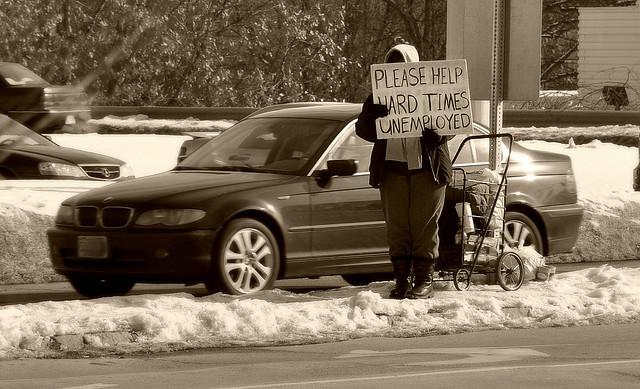If You're Unemployed for More Than 6 Months, Getting a Job Becomes Really Hard
倘若你失业长达6个月以上,就很难再就业了
Lately, we tend to talk the fate of the long-term unemployed in terms of extending their unemployment benefits, partly because the machinations of Congress are easier to discuss than the vague hope that folks who've been out of work for 27 weeks or more will be able to find jobs. Worse, there's good evidence that many of them won't find work -- perhaps ever.
最近,我们经常从延长失业补助津贴方面来讨论长时间失业人员的命运,某种程度上是因为与失业长达27周以上的人能就业的微小希望相比,人们更容易认为这是国会的阴谋。更糟糕的是,有很好的证据表明:他们将不能再就业——或许永远都不能。
 "At the height of the jobs crisis, 6.8 million Americans had been unemployed for more than six months," writes Ben Casselman at Five Thirty Eight. "The number is much smaller today not because the long-term unemployed, as these Americans are defined by the Labor Department, have found jobs, but because they have given up looking for work. And 3.8 million long-term jobless in February is still three times as many as before the recession."
"At the height of the jobs crisis, 6.8 million Americans had been unemployed for more than six months," writes Ben Casselman at Five Thirty Eight. "The number is much smaller today not because the long-term unemployed, as these Americans are defined by the Labor Department, have found jobs, but because they have given up looking for work. And 3.8 million long-term jobless in February is still three times as many as before the recession."Ben Casselman在《五三八》上面写道“在就业危机最严重的时期,680万的美国人失业时间长达6个月以上。现在失业人数很少,并不像美国劳工部声称是因为长时间失业的人找到了工作,而是因为他们已经放弃找工作了。而且在二月份,380万长时间失业的人数还保持在大萧条之前的三倍。”
You read that right: there are technically fewer long-term unemployed, but only because of the people who have given up -- taking early retirement, say, or resigning themselves to live on other government programs, or go off the economic grid entirely into shadow economies, doing odd jobs and other "legal hustling."
你的理解很正确:从数据上看,长时间失业的人数很少;但这仅仅是因为人们放弃工作——或者说提早退休,或者辞职来靠政府政策生活,或者脱离经济圈进入影子经济,做临时工和其他“合法且忙碌赚钱的工作。”
In fact, as Casselman points out, the fate of the long-term unemployed has always been grim. Prior to 2007, only 15 percent of those who had been out of work for an extended period of time were able to find jobs in any month; short-term unemployed rejoined the workforce at twice that rate.
实际上,正如Casselman指出的那样,长时间失业者的命运是很糟糕的。在2007年之前,失业一段时间之后,只有15%的人每个月都能找到新的工作;30%的人在短时间失业之后可以再就业。
The numbers are worse from 2008 to 2011, according to a Brookings paper by Princeton economist Alan Krueger, and graduate students Judd Cramer, and David Cho. The paper showed that only 11 percent of workers unemployed 27 weeks or longer returned to work on a full-time basis. Twenty-four percent found part-time work, 30 percent continued to look for work, and 35 percent stopped looking altogether.
根据普林斯顿经济学家Alan Krueger、研究生Judd Cramer与David Cho共同发表的布罗斯金研究文件来看,2008~2011年的数据更糟糕。文件显示失业时间长达27周以上的人员,其中只有11%的人员重返全职工作岗位。24%的人找到了兼职,30%的人继续找工作,35%的人既不找兼职、也不找全职工作。
The real question is how to break the cycle and give workers who've been unemployed for longer a better chance at re-entering the workforce.
真正的问题在于如何打破这种循环,并给与长时间失业者一个更好的再就业机会。
"Overcoming the obstacles that prevent many of the long-term unemployed from finding gainful employment, even in good times, will likely require a concerted effort by policy makers, social organizations, communities and families, in addition to appropriate monetary policy," Krueger and his co-authors write.
Krueger与其合作者写道“即使在繁荣时期,克服那些阻碍长时间失业者找到赚钱的工作的绊脚石,也很可能会需要决策者、社会组织、社会团体、家庭以及恰当的货币政策的共同协作。”
In short, just restoring benefits won't be enough. We'll also have to change how employers and citizens think about the long-term unemployed.
简而言之,只是恢复津贴补助是不够的。我们还需要改变用人单位与市民对长时间失业者的看法。
Tell Us What You Think
告诉我们你的看法
Did you find a job after long-term unemployment?
长时间失业之后,你找到工作了吗?











